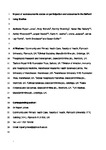Impact of socioeconomic status on participation and outcomes in the Salford Lung Studies

Date
2020-01Author
Subject
Metadata
Show full item recordAbstract
<jats:p>COPD and asthma prevalence is associated with socioeconomic status (or “deprivation”), yet deprivation is rarely considered in typical large-scale efficacy randomised controlled trials that recruit highly selected patient populations. In this <jats:italic>post hoc</jats:italic> analysis of the Salford Lung Studies in COPD and asthma (two 12-month, open-label, effectiveness randomised controlled trials conducted in UK primary care), we evaluated the impact of patient deprivation on clinical outcomes with initiating fluticasone furoate/vilanterol <jats:italic>versus</jats:italic> continuing usual care.</jats:p><jats:p>Patients were categorised into deprivation quintiles based on postcode and a countrywide database of indices of deprivation, and trial outcomes by quintile were assessed.</jats:p><jats:p>52% of patients in the COPD study were included in the most deprived quintile, contrasting with 20% in the asthma study. Greater deprivation was associated with higher rates of primary/secondary healthcare contacts and costs. However, the treatment effect of fluticasone furoate/vilanterol <jats:italic>versus</jats:italic> usual care for primary (COPD: moderate/severe exacerbations; asthma: Asthma Control Test responders at week 24) and secondary/other (healthcare consumption, adherence, treatment modifications, study withdrawals, exacerbations, serious adverse events) outcomes was similar across deprivation quintiles.</jats:p><jats:p>Our findings support the recruitment of participants from all socioeconomic strata to allow assessment of data generalisability to routine clinical practice.</jats:p>
Description
Collections
Publisher
Place of Publication
Journal
Volume
Issue
Pagination
Number
Recommended, similar items
The following license files are associated with this item:

